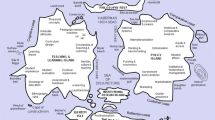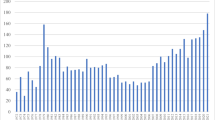Abstract
This article builds upon existing research which has been mapping and analysing the field of higher education research, and, in particular, on the analysis of the articles (n = 406) in 17 specialist higher education journals published in the English language outside of North America during the year 2000. It extends that analysis by examining the citations (n = 10,065) given in the articles, in particular the patterns of co-citation. This enables a clearer identification of the tribes or communities of practice that occupy the territory of higher education research. An attempt is be made to identify the key members of these tribes or communities, and to chart the key relationships within and between them.

Similar content being viewed by others
References
Bagilhole, B. (2002). Challenging equal opportunities: Changing and adapting male hegemony in academia. British Journal of Sociology of Education, 23(1), 19–33.
Becher, T. (1989). Academic tribes and territories: Intellectual enquiry and the cultures of disciplines. Milton Keynes: Open University Press.
Becher, T. (1999). Professional practices: Commitment and capability in a changing environment. New Brunswick, NJ: Transaction Publishers.
Becher, T., & Trowler, P. (2001). Academic tribes and territories: Intellectual enquiry and the culture of disciplines (2nd ed.). Buckingham: Open University Press.
Brooks, A., & Mackinnon, A. (Eds.) (2001). Gender and the restructured university. Buckingham: Open University Press.
Collins, R. (1998). The sociology of philosophies: A global theory of intellectual change. Cambridge, MA: Belknap Press.
Desmedt, E., & Valcke, M. (2004). Mapping the learning styles ‘Jungle’: An overview of the literature based on citation analysis. Educational Psychology, 24(4), 445–464.
Fanghanel, J. (2004). Capturing dissonance in university academic training environments. Studies in Higher Education, 29(5), 575–590.
Fuller, A., Hodkinson, H., Hodkinson, P., & Unwin, L. (2005). Learning as peripheral participation in communities of practice: A reassessment of key concepts in workplace learning. British Educational Research Journal, 31(1), 49–68.
Hargens, L. (2000). Using the literature: Reference networks, reference contexts and the social structure of scholarship. American Sociological Review, 65, 846–865.
Hendry, C. (1996). Understanding and creating whole organizational change through learning theory. Human Relations, 49, 621–641.
Howie, G., & Tauchert, A. (Eds.) (2002). Gender, teaching and research in higher education: Challenges for the 21st century. Aldershot: Ashgate.
Hyland, K. (2000). Disciplinary discourses: Social interactions in academic writing. Harlow: Longman.
Hyland, K. (2001). Humble servants of the discipline?: Self-mention in research articles. English for Specific Purposes, 20, 207–226.
Lave, J., & Wenger, E. (1991). Situated learning: Legitimate peripheral participation. Cambridge: Cambridge University Press.
Tight, M. (2003). Researching higher education. Maidenhead: Open University Press.
Tight, M. (2004a). The RoutledgeFalmer reader in higher education. London: RoutledgeFalmer.
Tight, M. (2004b). Research into higher education: An a-theoretical community of practice? Higher Education Research and Development, 23(4), 395–411.
Tight, M. (2006). Higher education research: A citation analysis. Higher Education Review, 38(2), 42–59.
Tight, M. (2007). Bridging the divide: A comparative analysis of articles in higher education journals published inside and outside North America. Higher Education, 53(2), 235–253.
Trowler, P., & Knight, P. (2000). Coming to know in higher education: Theorising faculty entry to new work contexts. Higher Education Research and Development, 19(1), 27–42.
Wenger, E. (2000). Communities of practice and social learning systems. Organization, 7(2), 225–246.
White, H. (2004). Citation analysis and discourse analysis revisited. Applied Linguistics, 25(1), 89–116.
Author information
Authors and Affiliations
Corresponding author
Rights and permissions
About this article
Cite this article
Tight, M. Higher education research as tribe, territory and/or community: a co-citation analysis. High Educ 55, 593–605 (2008). https://doi.org/10.1007/s10734-007-9077-1
Received:
Accepted:
Published:
Issue Date:
DOI: https://doi.org/10.1007/s10734-007-9077-1




